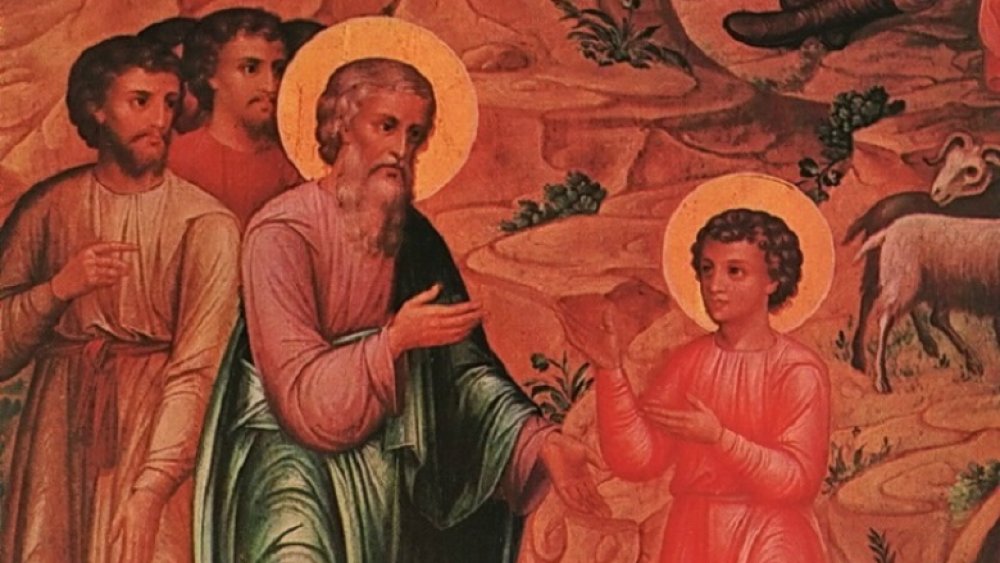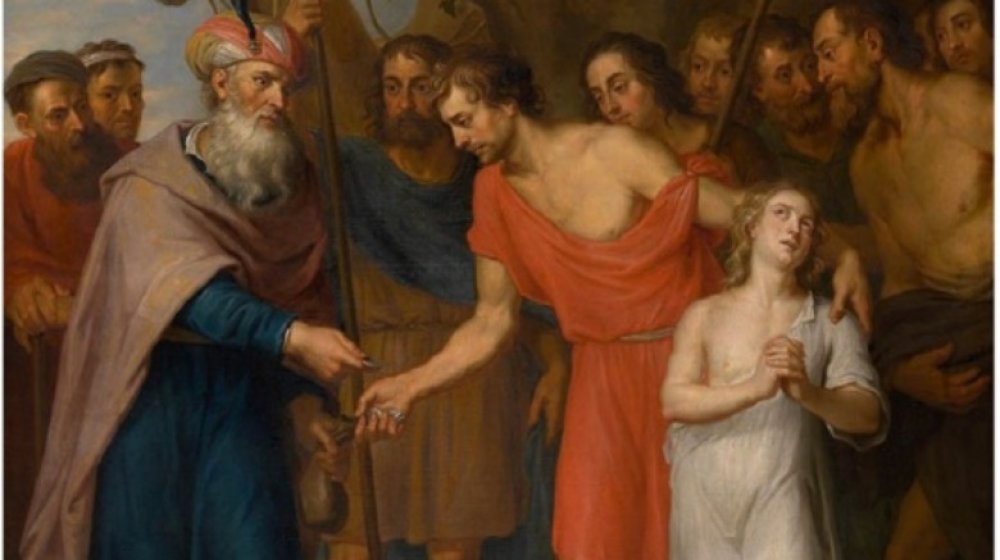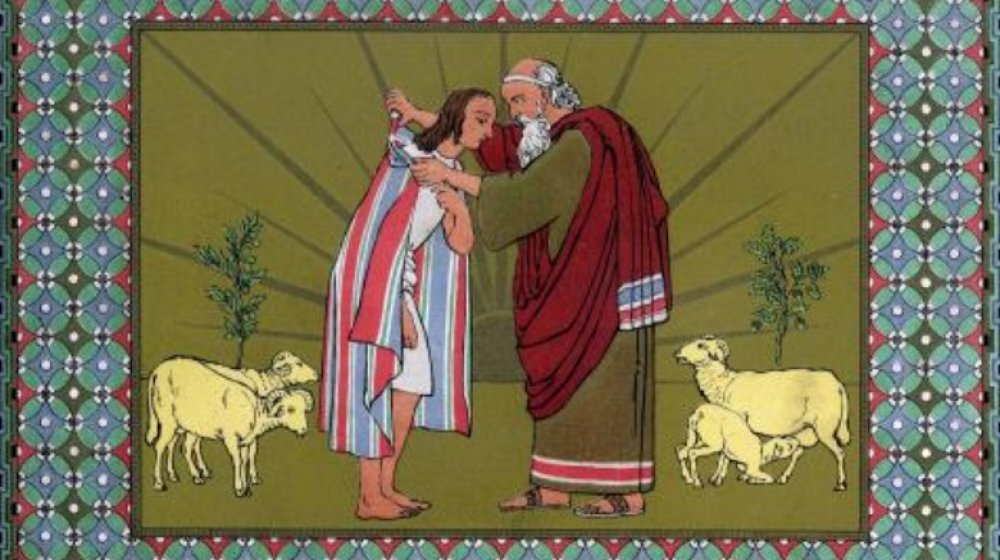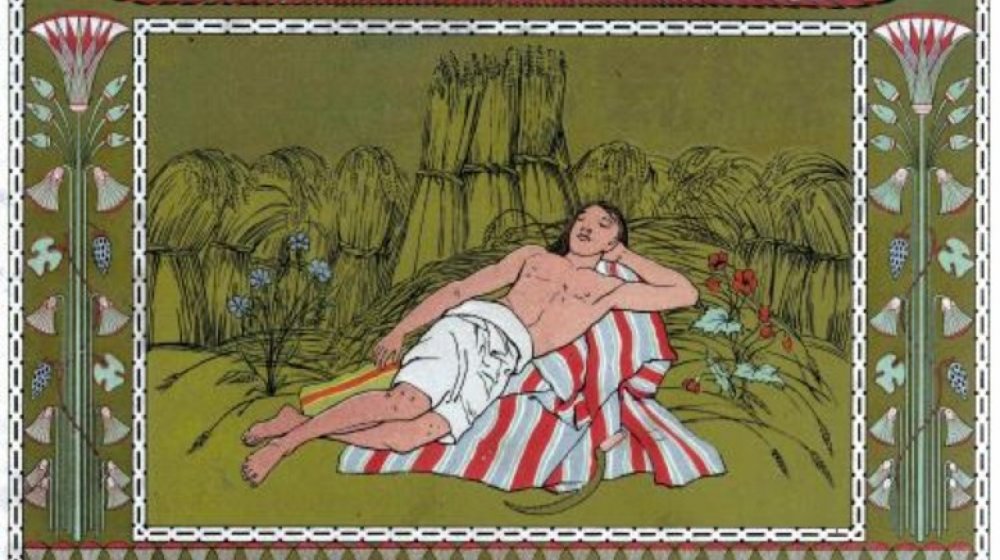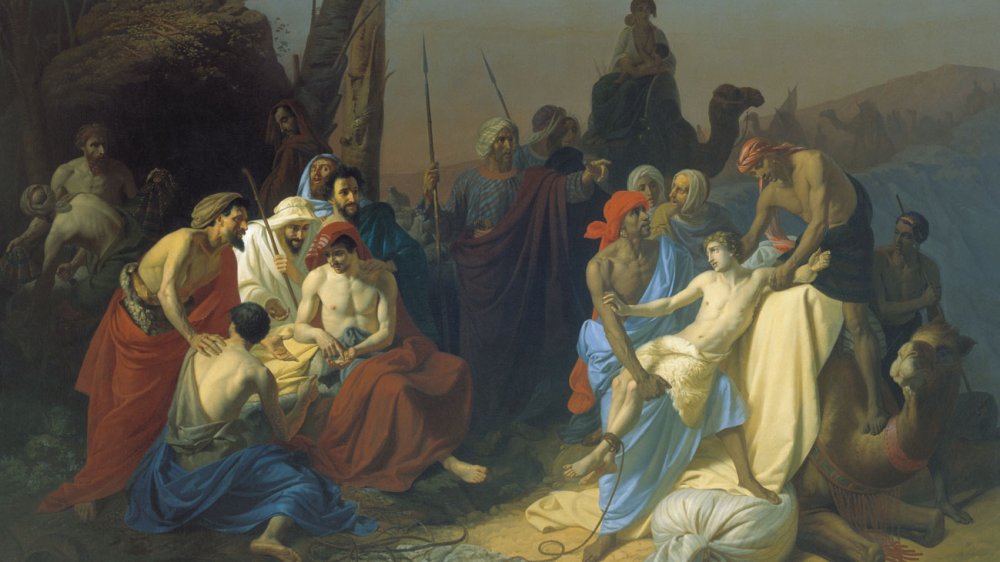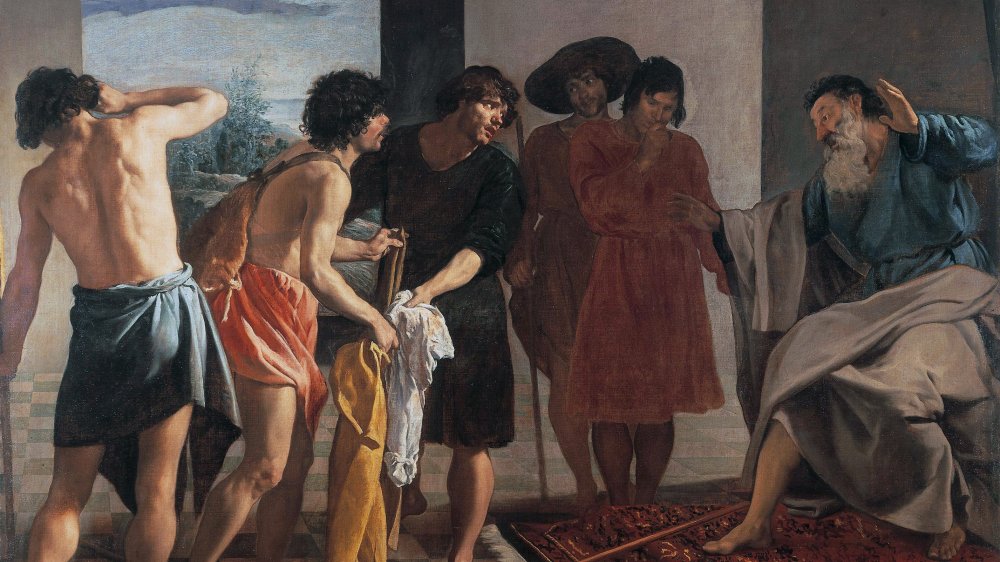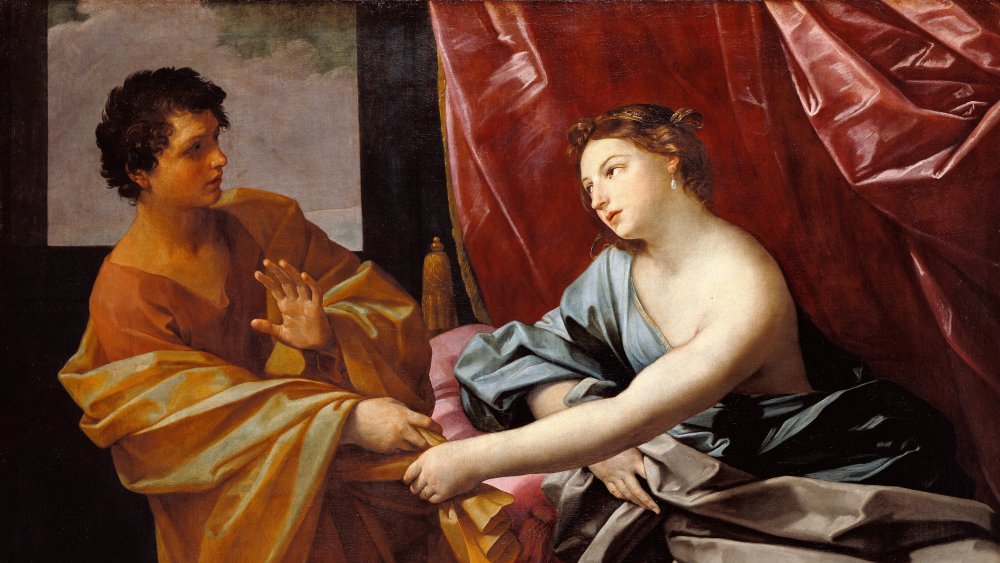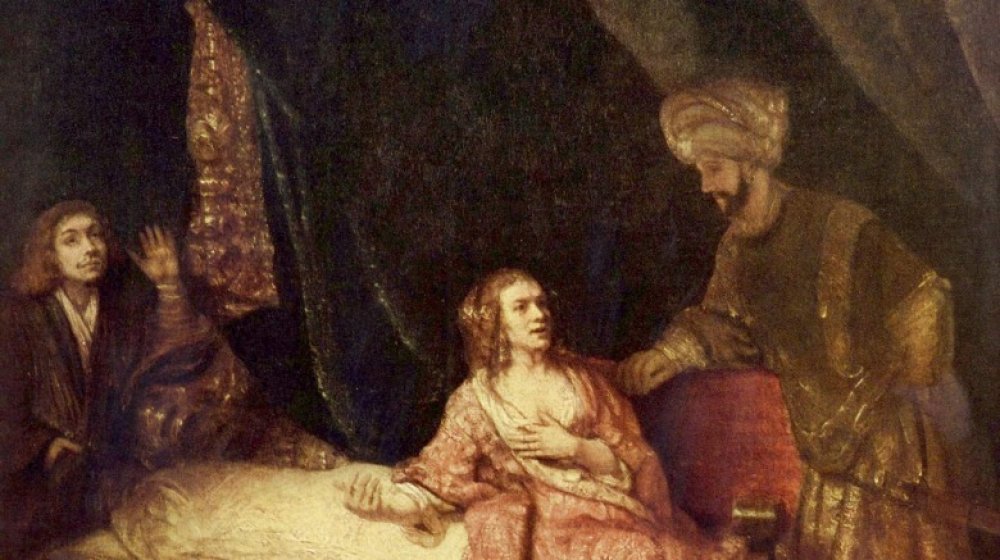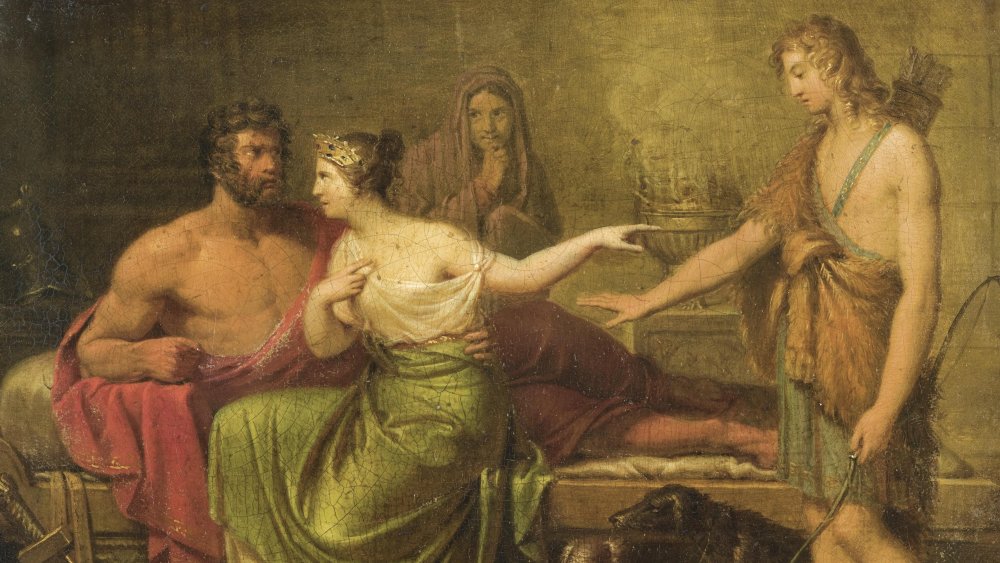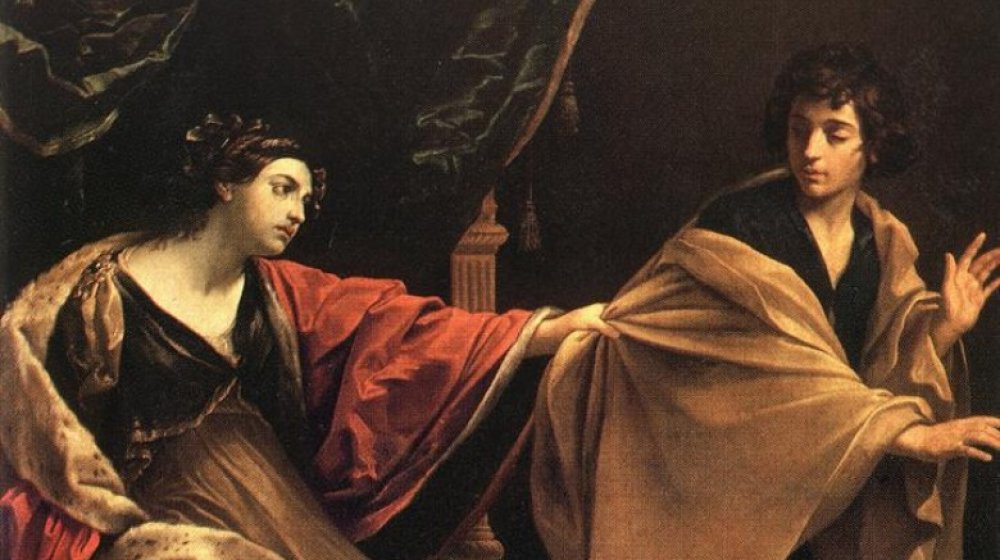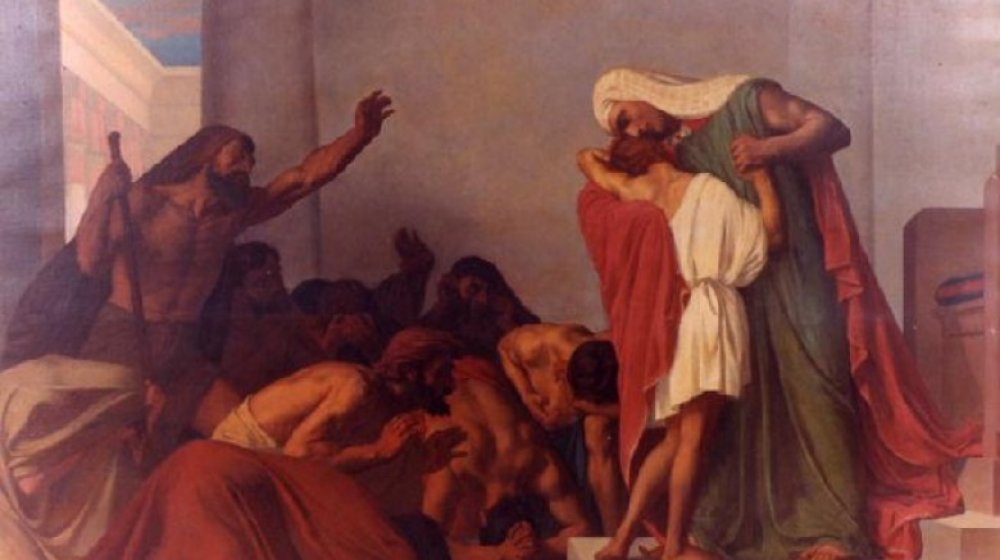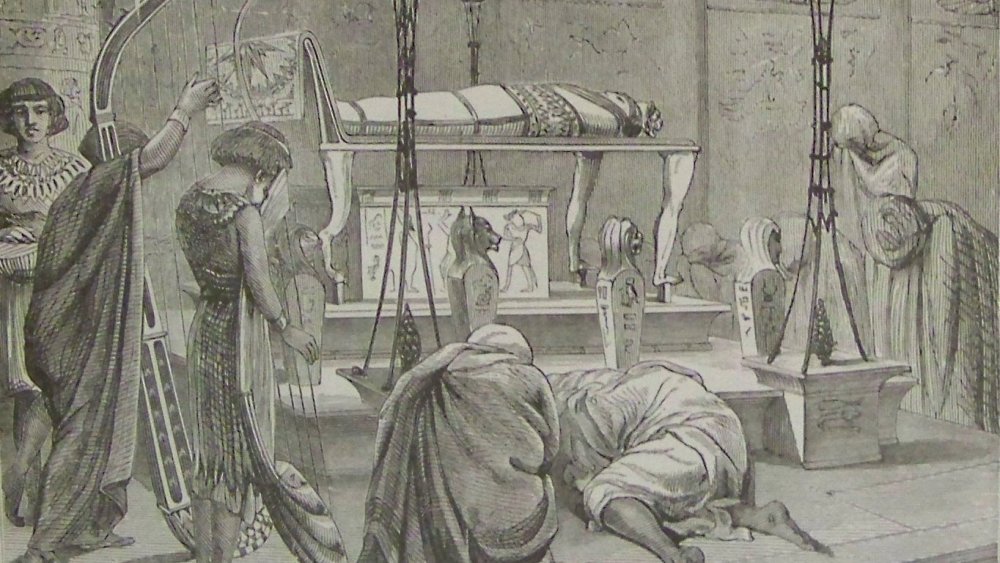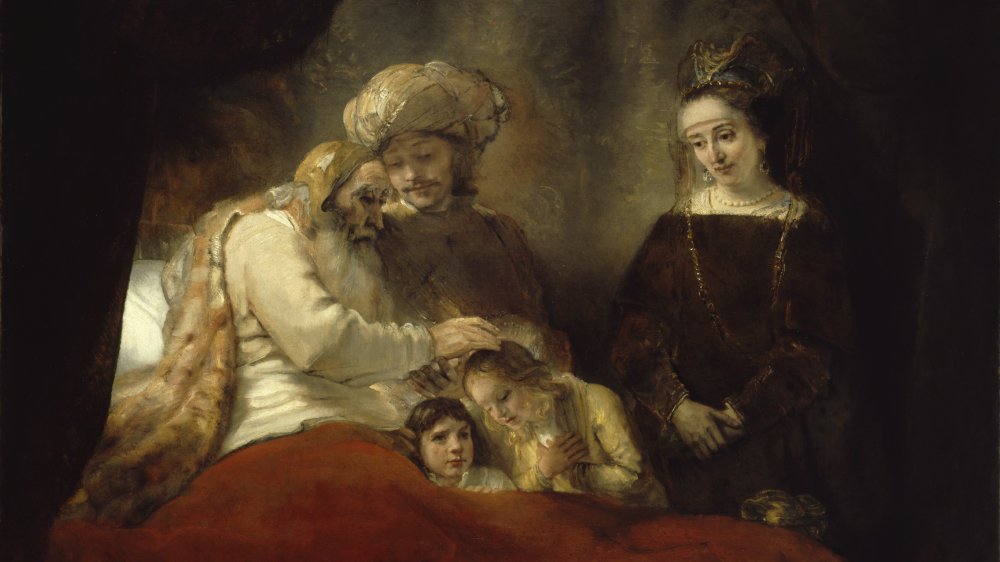The Untold Truth Of Joseph In The Old Testament
While other figures like Adam and Eve and Noah might get more attention, Joseph is one of the main characters of Genesis, the first book of the Bible. He's the favored son of Jacob, also known as Israel, after whom the whole nation was named. He's also the great-great-grandson of Father Abraham, who–Sunday School joke coming up–had many sons, and many sons had Father Abraham. Joseph plays a key role in the Israelites settling in Egypt, which obviously becomes a whole thing with Moses in the second book of the Bible, Exodus.
If all you know about Joseph is his Technicolor Dreamcoat, there's a lot more to him. Heck, if all you know is every word written about him in the book of Genesis, there's a whole mountain of tradition, explication, and legend all about the boy who went from being thrown in a pit to ruling Egypt. Here are a few things you might not have known about Joseph, Lord of Dreams.
Joseph was born virtuous
As far as the canonical Bible goes, Joseph's appearances are pretty much limited to the last third of the book of Genesis. However, as the Jewish Encyclopedia points out, there is no patriarch who stars in as many traditional legends as Joseph. As you will see, many of those legends center around his time as a slave in the house of the Egyptian captain Potiphar, but the stories about Joseph go all the way back to his birth.
Rabbinical literature notes that Joseph was in many ways the spitting image of his father Jacob, not only in physical appearance but in virtue. As a bodily symbol of Joseph's complete righteousness, legend says that he was born circumcised; that is, already in covenant with God. Commentaries on Genesis say that the only reason the Red Sea parted for Moses later was the presence of the bones of Joseph. Furthermore, when Joseph and his mother met Jacob's brother Esau in Genesis 33, tradition says that Joseph kept his uncle from looking lasciviously at his mother (ew) by blocking her from view, and as a reward Joseph and all his descendants were made immune to the curse of the evil eye, which is no small thing in Jewish culture.
Joseph's Dreamcoat might not have been Technicolor
If you only know one thing about Joseph, it's probably that he was at one point in possession of what you might call a coat of many colors if you're a Dolly Parton fan, or a technicolor dreamcoat if you're an Andrew Lloyd Weber fan. This coat was a gift from his father as a sign of Jacob's favoritism toward Joseph, which was either due to his being the first son of Jacob's favorite wife Rachel, or because he looked exactly like him, depending on the account. This coat (and the favoritism it represented) was a major source of discord for Joseph's older brothers and basically the inciting incident for Joseph's whole life story.
Only, as it turns out, the coat may not have been many-colored after all. As Old Testament professor Claude Mariottini explains, the tradition of calling it a coat of many colors stems from a mistranslation of the Greek version of Genesis. In fact, the Hebrew words to describe Joseph's coat call it a ketonet passim, which has no known translation and which is otherwise only used in the Bible to describe a special garment worn by a king's daughter. Some scholars interpret the word passim as being related to a word for hands or feet, so sometimes Joseph's robe is described as having long sleeves or reaching all the way to the ground. It might have even just meant "really nice robe."
Joseph was the Lord of Dreams
Joseph's 11 older brothers had a number of reasons for being angry at him: their dad loved him best, he had a cool jacket that none of them had, and Joseph grassed them up when they did mystery crimes, but the final straw had to be the dreams. According to Genesis 37, Joseph had two prophetic dreams that his brothers didn't like the sound of. In the first, all 12 brothers were out gathering grain when all the brothers' grain bundles suddenly started bowing to Joseph's. In the second dream, the sun, the moon, and 11 stars were all bowing to Joseph. Rightly interpreting that these celestial objects meant them and their mother and father, Joseph's brothers decided they weren't interested in bowing to their baby brother (spoiler: they will, though).
Joseph's facility with prophetic dreams–both having and interpreting them–doesn't end there. In fact, in Genesis 37, he is referred to–derisively but accurately–by his brothers as "the lord of dreams." It is Joseph's ability to accurately tell the future from dreams that allows him to get out of prison after things go south with Potiphar and later helps him rise to the position of vizier of Egypt after currying favor with the Pharaoh when he correctly predicted a famine. While Joseph's father, grandfather, and great-grandfather get all the respect as the Patriarchs of Judaism, none of them had a straight-up superpower like that.
How many times was Joseph sold into slavery?
A rabbi's whole deal is that they need to be able to read, discuss, meditate on, and explain the text and tiny details of the scriptures, so it's not super surprising that a pretty hefty portion of rabbinical literature centers on places where things are phrased weirdly in said scriptures. If you're not Jewish, you might look at the story of Joseph's brothers selling him into slavery (because they were mad about the dream thing, you see) and answer the question "How many times was Joseph sold?" by replying the Bible says he was sold once. But if you're a rabbi, history's closest close-readers, your answer might be, "Five times, obviously."
The Jewish Federation explains how this can be: Genesis 37 mentions a group of Ishmaelites that the brothers want to sell him to, but later tells of a group of Midianites, whom a lesser reader might understand to be the same people. Later a group of "Medanites" sell him to Potiphar in Egypt. An alternate spelling of Midianites? Clearly no. Then chapter 39 says Potiphar bought Joseph from Ishmaelites (still not the same)! So, how many times was Joseph sold? Five times. The brothers to the Ishmaelites, the Ishmaelites to the Midianites, the Midianites to the Medanites, the Medanites back to the Ishmaelites, and the Ishmaelites to Potiphar. Hopefully everything is clear to you now.
The archangel Gabriel had Joseph's back
The account in Genesis 37 tells us that Joseph's slavery came about in this way: Jacob sent Joseph to check on his brothers, he couldn't find them, and so a man told them where they had gone. When he arrived, the brothers wanted to kill him, but their eldest brother Reuben suggested throwing him in a dry pit instead, with the intent of rescuing him later. They stripped him of his fancy coat, threw him in a dry pit, and then sold him into slavery when the Ishmaelites happened by.
Naturally, popular legend embellishes this account somewhat. In The Legends of the Jews, collected by Louis Ginzberg, we learn that the man who told Joseph where to find his brothers was actually the archangel Gabriel in disguise, who is there to ensure Joseph's destiny is fulfilled. The brothers originally planned to murder Joseph with dogs until Reuben talked them out of it, knowing that as the oldest he would take the blame. His intention to rescue Joseph led him to be blessed with descendants who would be the first to offer help in times of trouble. The pit Joseph was thrown in was full of snakes and scorpions, but the hand of the Lord protected him. Gabriel then made the stripped Joseph a magical garment that he would wear for his whole time in Egypt, because God thought it would be tacky for him to be a naked slave.
Potiphar's wife had the hots for Joseph
After being sold somewhere between one and five times, Joseph finds himself a slave in the household of Potiphar, the captain of the Pharaoh's guard. The account in Genesis 39 tells us that Potiphar's wife (unnamed in the Bible) fell in love with the handsome young slave and tried to seduce him. The virtuous young man rejects her, which is both the right and wrong move, as Potiphar's wife accuses Joseph of assaulting her, which lands him in jail.
The episode of Joseph and Potiphar's wife is the inspiration for much of the rabbinical and legendary material about Joseph. For example, The Legends of the Jews recounts the various means by which Potiphar's wife (given the name Zuleika in popular accounts) tries to seduce Joseph. And how could she not? Joseph was so handsome that all Zuleika's maids stare at him and unthinkingly cut their hands while peeling oranges. First Zuleika pretends to want to adopt him (an extremely sketchy strategy), then promises to reward him with power or renounce the worship of idols or murder her husband. When these fail, she tries giving him enchanted food. When Joseph won't even look at her, she has his head shackled so he can't turn away. It's good that Joseph resists, because the Lord appears to him and tells Joseph that if he touches Zuleika, God will cause the world to crumble to dust. Yikes.
Potiphar himself might have also had the hots for Joseph
If it's not enough that Joseph was constantly being hounded by Potiphar's wife, some rabbinic traditions suggest that Potiphar himself might have tried to seduce Joseph as well. This is another one of those instances where a whole story exists to explain the presence of a mysterious word in the biblical text. In this case, the mystery word is the name "Potiphera," which appears only once in Genesis 41 as the name of a priest whose daughter Joseph marries after being disentangled from the whole Potiphar's wife mess.
You might have noticed that the name "Potiphera" is pretty similar to "Potiphar." Well, so did rabbinical commentators. ReformJudaism.org explains that the Talmud and the famous rabbi Rashi both suggest that what happened was that Potiphar intended to use Joseph for, you know, bedroom purposes, but at the last minute the angel Gabriel swoops in and removed all of Potiphar's downstairs business, saving Joseph in arguably the most terrible way possible. Potiphar subsequently takes the name Potiphera, both because that name sounds more feminine to Hebrew-speaking ears, and because it's a pun on the Hebrew word ufeir'o, meaning "mutilated." Since he was technically a eunuch now, he decided to become a priest, because priests have to be eunuchs anyway. And so Joseph actually married Potiphar's daughter, as Potiphar was now both Potiphera and a priest, which is more likely than two guys having similar names.
Potiphar's wife as mythological motif
It is not unusual for stories from the Bible to have strangely similar echoes in tales from other ancient mythologies. For example, the story of Noah's flood is noticeably similar to the account of Deucalion and Pyrrha in Greco-Roman myth and the Mesopotamian tale of Utnapishtim. Likewise, the story of baby Moses has similarities to the infancies of Sargon of Akkad and Oedipus, and so on. The episode of Joseph and Potiphar's wife is no exception to this phenomenon. The general shape of a woman attempting to seduce a young man and then accusing him of assault when rejected appears as a common motif in ancient myth.
The most notable comparison is the tale of Theseus's son Hippolytus, whose dedication to chastity puts him at odds with his lustful stepmother Phaedra. The Encyclopedia Britannica says his tragedy ends with a heartbroken Phaedra dead at her own hand and a falsely accused Hippolytus crashing his chariot to death when a giant cow comes out of the ocean (yes, mythology is weird sometimes). Likewise, the queen Stheneboea falsely accused the hero Bellerophon, the punishment for which was getting sent to kill the Chimera, but at least he got to ride a flying horse instead of being crushed by sea cow like Hippolytus. Other echoes can be found in the stories of Peleus and Cretheis, and Tenes and Philonome.
The accused Joseph was saved by a talking baby
The conclusion of the episode of Joseph in Potiphar's house as described in Genesis chapter 40 shows Joseph running away from Potiphar's wife's advances, but she manages to snatch his robe off of him, which she uses as evidence of Joseph assaulting her. The result is Joseph being put in jail until he can dream-interpret his way out of there.
Fortunately, Legends of the Jews gives us more details. In the extended version of the story, Potiphar has Joseph whipped for his alleged crime, but when Joseph prays to be delivered from this unfair punishment at the hand of Gentiles, God causes Zuleika's baby to start miraculously speaking. The baby tells in full detail all of Zuleika's failed attempts to seduce Joseph and that they should look at Joseph's lost robe more closely. Upon further inspection, Potiphar finds that Joseph's robe was ripped at the back, indicating that he was trying to run away, and not the front, which would have indicated more defensive maneuvers from Zuleika. Although at this point Potiphar fully believes in Joseph's innocence, he must still put Joseph in prison to save his family from gaining a bad reputation. Joseph's reward for chastity and faithfulness to God is that he gets an extra letter H added to his name. Now called Jehoseph, he is one letter closer to the sacred name of God, YHWH.
Joseph almost destroyed Egypt to prank his brothers
To make a long story short, Joseph gets out of prison by correctly interpreting the dreams of other prisoners and finds favor with the Pharaoh by correctly predicting a cycle of famine and plenty. Pharaoh makes him vizier, a position of high influence within Egypt. Then his brothers, affected by the famine, come to Egypt to buy grain, which the country has shrewdly stockpiled under Joseph's advice. His brothers don't recognize Joseph because they haven't seen him in like 20 years and now he's dressed all Egyptian-like.
In the canonical account, Joseph tests his brothers to see if they've grown any in the intervening years, which they have, and the brothers are joyfully united. The Jewish Encyclopedia shows that rabbinical literature expands this account. Joseph anticipates his brothers coming for grain, and so has all petitioners submit the name of their father on entry to the city. That means he knows when the guys first arrive, but when they don't proceed show up at the palace, Joseph sends men to look for them. The groups is discovered among the sex workers, allegedly because they were looking for Joseph, but come on. So Joseph messes with his brothers by claiming he used psychic powers to deduce they are spies, and the ensuing fight between Joseph's angry brothers and his guards threatens to destroy Egypt. Fortunately, Joseph stopped the prank before it brought down the country.
Joseph's underwater coffin
After Joseph gets his fill of almost destroying a mighty empire in order to mess with his older brothers, he reveals himself to them, and he is reunited with his family. Joseph then convinces Pharaoh to grant some land to his kin, and that's how the Israelites end up in Egypt, from which Moses will have to free them generations later. The book of Genesis ends with Joseph dying at age 110 and being buried in Egypt. Moses takes Joseph's bones out of Egypt with him during the exodus and reburies him on his father's land.
The Jewish Encyclopedia, however, tells us more specifically where Joseph's body was buried in Egypt. Apparently, Joseph was so beloved that the different districts wanted the honor of his being buried there; in the end, the compromise was to sink his coffin to the bottom of the Nile. During the exodus, one of Joseph's nieces shows Moses where the body had been sunk. Moses summons the coffin by throwing a pebble into the water and telling Joseph that all the Jews are getting out of Egypt and everyone is waiting on him. The coffin floats to the surface, and Moses himself carries Joseph's bones next to the Ark of the Covenant as the Israelites proceed to the Promised Land.
Joseph's line will give rise to a second, different Messiah
One of the core tenets of Jewish belief is the expectation of the arrival of a Moshiach (also spelled Messiah, meaning "anointed one") who will usher in a new age of universal peace and brotherhood. Generally, this term is understood to apply to a descendant of the line of King David, from the tribe of Judah, who will be the ultimate redeemer and liberator of mankind. Christians believe this Messiah–the Moshiach ben David–has already arrived in the form of Jesus, also called the Christ, which is the Greek translation of Messiah.
Perhaps less well known is that since the time of the Second Temple, Jewish tradition has taught of a second messiah, descended not from David, but from Joseph through his son Ephraim. As Chabad explains, this guy is known as the Moshiach ben Yossef, and his job is to basically be the main Messiah's number one guy. The Moshiach ben Yossef will prepare the world for the coming of the Moshiach ben David by waging war against the evil forces of the descendants of Esau, Jacob's older, hairier brother. This war will end with the Moshiach ben Yossef's death, which will lead to an era of all new calamities and tribulations. These will cease with the arrival of the Moshiach ben David, who will avenge his fellow Messiah, resurrect him, and then usher in the Messianic Age together as bros.
